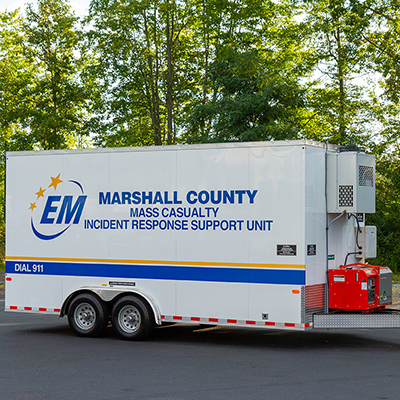Disaster preparedness isn’t an exact science; you can’t look into the future and see what’s coming. You can only utilize the information you have and make predictions based on it. You’ll have to make decisions based on data to refine your disaster response. What’s the size of your municipality or jurisdiction? Is it a dense urban environment, suburban, or a sparsely populated rural community? Is it located on or near a coast or large body of water? Is it prone to flooding, earthquakes, and other natural disasters? Is the population younger or older? Are there industrial facilities or power plants nearby? The answers to all of these questions will determine your area’s specific needs for disaster response and mass fatality trailers.
Types of Disaster Response Trailers
There are different types of mobile units and refrigerated trailers available to augment your emergency management system. Each type provides different advantages to emergency medical services (EMS), first responders, and medical examiners. Which is the right kind for your municipality? Let’s look at the available options.
Disaster Portable Morgue Unit
A Disaster Portable Morgue Unit (DPMU) is a deployable mortuary system with the capabilities of pathology, full-body x-ray, and victim identification. It’s also equipped for postmortem care such as body processing, preparation, and disposition. A portable mobile morgue can be set up near a disaster site, including warehouses, gymnasiums, or parking lots.
The Disaster Portable Morgue Unit is best used in situations where there is a need to identify decedents on-site rather than transporting them to a local morgue. For example, a building collapse where search and recovery efforts are ongoing at the site of the disaster.
Another scenario is a hazmat situation involving cleanup of hazardous material, and decontamination of cadavers is required. A Disaster Portable Morgue Unit can be that location to decontaminate human remains that have been tainted by radiological, chemical, or biological agents. Deceased victims and personal effects can be housed there until the next of kin are notified.
Penn Care is able to custom design a Disaster Portable Morgue Unit tailored for the requirements of your city or jurisdiction.
Mobile Morgue Expansion Trailers
Mobile Morgue Expansion Trailers (MMET) are refrigerated trailers specifically designed to serve as temporary morgues for mass fatality incidents. These types of incidents vary in size and scope. A flood or earthquake, for example, could produce large numbers of deceased in a short time. In contrast, the recent COVID-19 pandemic has resulted in fatalities over a long span of time. In all of these cases, morgue facilities were overwhelmed and human remains had to be stored outside of official morgue sites. Even funeral homes could be dealing with large numbers of deceased victims, with funeral directors having to rely on morgue trailers.
Mobile Morgue Expansion Trailers come in several different sizes to fit your jurisdiction’s needs. There are smaller seventeen- and thirty-one-foot-long models available. The seventeen-foot-long model can hold up to sixteen cadavers, and the thirty-one-foot-long model can hold up to forty-eight cadavers. The full-size, fifty-three-foot model can house up to ninety cadavers.
All of these models are built to maintain a temperature of thirty-five degrees Fahrenheit (in one hundred and ten degrees Fahrenheit outside temperature). They are fully insulated with four inches of nominal closed-cell polyurethane insulation. Their interiors are completely sealed to aid with cleaning and decontamination, and can even be hose washed. They are equipped with wide, easy access ramp systems for ease of loading cadavers. The refrigeration units are entirely self-contained, and the trailers also have safety features such as motion-sensing interior lighting and straps for securing cadaver racks. Both the seventeen- and thirty-one-foot trailer models feature bumper pull, so they can be towed by most SUVs or pickup trucks.
Additional Disaster Response Accessories
Besides the trailer or morgue unit, there are other accessories to help your response teams perform their jobs properly. Additional rack and tray systems to hold cadavers will help you maximize your trailer or morgue unit’s capacity. Mobile cadaver tray lifts are designed to assist with the loading and unloading of body trays onto rack systems. The lifts have a narrow body to navigate crowded situations and narrow aisles. They are foot pump controlled, have a 650 lb. weight capacity, and raise to a height of up to sixty-four inches.
In the event of inadequate power, having a generator ready is a must. If bodies have to be recovered in the region of a natural disaster, transportation accident, or terrorist attack, electricity services might be completely destroyed. In that case, a generator will allow victims’ bodies to be kept refrigerated.
Occasions for Refrigerated Morgue Trailers
When we examine the situations where a Mobile Morgue Expansion Trailer or Disaster Portable Morgue Unit might be necessary, we need to first look at the difference between a mass casualty incident and a mass fatality incident. They sound similar but there is one key difference.
A mass casualty incident is any occasion that results in a large number of injured and deceased victims, but a mass fatality incident specifically involves only a large number of deceased victims. Both types of incidents can have the same causes: natural or man-made disasters. The type of incident, along with the scale, will determine the type of response.
A mass casualty incident could require a triage system to administer first aid to the injured at the site. Refrigerated trailers may not be necessary in this case, as the incident may not lead to a surge that overtakes the local morgue facilities.
On the other hand, a mass fatality incident could require a completely different response tailored to the size of the disaster. In the event of a large-scale disaster, such as a plane crash or terrorist attack, the subsequent investigation and cleanup could take days or even weeks. Federal authorities may have to arrive and arrange an incident command location or another type of centralized operations center to keep multiple local, state, and federal agencies organized. Authorities may also establish a family assistance center (FAC) to handle the arrival of grieving families and keep them informed of the developing situation. Mobile Morgue Expansion Trailers and Disaster Portable Morgue Units could be necessary for storing the deceased victims while a crime scene is processed and the investigation is carried out.
In the case of the COVID-19 pandemic, both small communities and large cities alike saw the advantages of Mobile Morgue Expansion Trailers. Rather than a sudden surge, the number of victims slowly continued to mount as the virus swept through the country. There were even situations where authorities could not reach the victim’s next of kin, only to find that they too had died from contracting COVID-19. With their morgues overflowing, many cities were initially forced to rely on trailers normally used for refrigerated food delivery. Soon enough, they were able to procure Mobile Morgue Expansion Trailers to provide the necessary relief so that operations could continue.
MMET Delivery: Marshall County Emergency Management
Penn Care recently delivered a Mobile Morgue Expansion Trailer to the Office of Emergency Management in Moundsville, West Virginia. The Office of Emergency Management’s role is to coordinate the response to disasters and other major emergencies across Marshall County. The Office also oversees the development of countywide emergency plans and regularly participates in exercises and drills with volunteer groups, local agencies, as well as state and federal agencies.
Marshall County needed a turnkey solution for refrigerating remains. The Office of Emergency Management’s representatives wanted an apparatus immediately ready for use, with no additional assembly or setup. After learning about the body refrigeration solutions that Penn Care can provide, they determined that the seventeen-foot, sixteen-body trailer was perfect for their specific requirements.
Marshall County is an example of a location in the United States that is not necessarily prone to extreme weather events like hurricanes or tornadoes, nor geological events like earthquakes. It’s relatively rural and not an attractive, high-value target for a terrorist attack. But it’s not immune to events like mass shootings, transportation disasters, or a pandemic. Leaders in Marshall County decided that it’s best to prepare for whatever scenario might present itself.
Prepare for Mass Fatality and Mass Casualty Incidents
Mobile Morgue Expansion Trailers and Disaster Portable Morgue Units are valuable additions to any municipalities resources to be better prepared for different kinds of incidents. With them, the deceased can be housed and attended to respectfully while avoiding a public health crisis due to a mounting death toll and overwhelmed morgue facilities. There is also the added benefit of increased morale and mental health of first responders and law enforcement.
Contact Penn Care today to find out how we can help your community meet your needs for disaster response and mass fatality trailers. We’re your complete healthcare solution for medical supplies, personal protective equipment, and disaster response.



